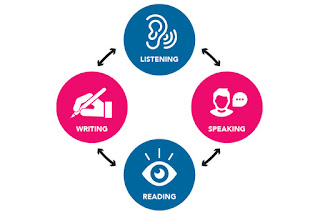Mastering the Four Essential Skills: A Holistic Approach to Effective Teaching By Ahmed Elghezlani
By Ahmed Elghezlani
In the realm of education, the development of language skills is paramount for effective communication and lifelong learning. Language learning involves the acquisition and refinement of four essential skills: listening, speaking, reading, and writing. These skills collectively form the foundation of language proficiency and enable individuals to effectively navigate various academic, professional, and social contexts. This article explores the significance of teaching the four skills and provides insights into strategies that educators can employ to facilitate comprehensive language development.
1. Listening:
Listening is the cornerstone of effective communication. Proficient listening skills enable learners to comprehend spoken language, follow instructions, and engage in meaningful conversations. Educators can enhance listening skills by incorporating various activities such as audio recordings, interactive discussions, and comprehension exercises. Encouraging active listening through focused attention, note-taking, and summarizing helps students grasp essential information, discern context, and develop critical thinking abilities.
2. Speaking:
Speaking proficiency empowers individuals to express their thoughts, engage in discussions, and articulate ideas coherently. Encouraging speaking skills requires creating a supportive and interactive classroom environment where students feel comfortable communicating. Opportunities for pair or group work, presentations, debates, and role-plays foster speaking confidence and fluency. Additionally, providing constructive feedback, language models, and ample practice opportunities help learners refine pronunciation, vocabulary usage, and grammatical accuracy.
3. Reading:
Reading comprehension enables individuals to understand written texts, extract information, and develop a broad range of vocabulary. Cultivating reading skills involves exposing students to diverse genres, authentic materials, and graded texts that align with their language proficiency levels. Teachers can employ strategies such as pre-reading activities, guided reading exercises, and post-reading discussions to enhance comprehension and critical thinking. Encouraging independent reading habits also nurtures a love for literature and expands students' knowledge base.
4. Writing:
Writing proficiency equips learners with the ability to convey their thoughts, organize ideas cohesively, and communicate effectively through written texts. Educators can foster writing skills by providing clear instructions, models, and structured writing tasks that gradually increase in complexity. Promoting brainstorming, outlining, drafting, editing, and proofreading techniques cultivates effective writing habits. Additionally, incorporating opportunities for creative writing, essays, research papers, and collaborative writing projects enables students to explore various writing styles and genres.
Integration and Assessment:
To ensure comprehensive language development, it is crucial to integrate the four skills seamlessly within the curriculum. Interdisciplinary approaches that intertwine listening, speaking, reading, and writing foster a holistic learning experience. For instance, listening activities can lead to discussions or debates, while reading tasks can inspire writing assignments or oral presentations. Regular formative and summative assessments provide valuable insights into students' progress and allow educators to tailor instruction accordingly.
Technology and Authentic Materials:
Incorporating technology and authentic materials enhances language learning and provides real-world context for skill development. Digital resources, online platforms, and language learning applications offer engaging multimedia content, interactive exercises, and personalized feedback. Authentic materials, such as newspapers, articles, and videos, expose learners to natural language use, cultural nuances, and current events, facilitating a deeper understanding of the language and its context.
Teaching the four language skills—listening, speaking, reading, and writing—provides a comprehensive and balanced approach to language acquisition. By integrating these skills and employing diverse teaching strategies, educators can foster well-rounded language proficiency in their students. Nurturing the four skills not only enhances communication abilities but also cultivates critical thinking, creativity, and cultural awareness. Empowering learners with these essential language skills equips them to thrive academically, professionally, and personally in our increasingly interconnected world.



Comments
Post a Comment